
Features
Production
Research
On-farm demonstration projects promoting sustainable apple production practices in B.C., Ontario
projects promoting sustainable apple production practice
March 13, 2008 By Bernie Solymár
Since 2001, the National Apple
Integrated Fruit Production (IFP) Program, administered by the Canadian
Horticultural Council (CHC), has been underway in various
apple-producing regions within Canada, including Ontario and the
Okanagan Valley in B.C.
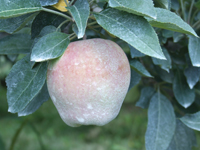 |
| Surround, or kaolin clay, is applied to trees to protect against insect pests and reduce sunburn on the fruit. Photo courtesy of Bernie Solymár |
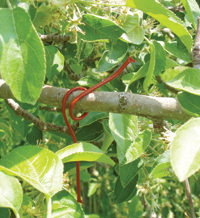 |
| Pheromone mating disruption for Oriental fruit moth has been very effective in Norfolk County. Photo courtesy of Bernie Solymár |
 |
| Pearl millet, seen here planted as a pre-plant cover crop on the Schooley farm near Simcoe, Ontario, effectively reduces nematode numbers in the soi. Photo courtesy of Bernie Solymár. |
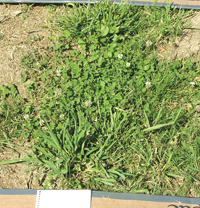 |
| Weed surveys are conducted as part of the Okanagan Valley IFP trials. Photo courtesy of Bernie Solymár |
Since 2001, the National Apple Integrated Fruit Production (IFP) Program, administered by the Canadian Horticultural Council (CHC), has been underway in various apple-producing regions within Canada, including Ontario and the Okanagan Valley in B.C. Funded through Agriculture and Agri-Food Canada’s CanAdapt program, the first phase of the IFP project (2001-2004) culminated in the development and national distribution of the publication, Integrated Fruit Production Guidelines for Apple Orchards in Canada, a grower workbook, delivery of a national conference on IFP held in December 2002 in Montréal, Québec, and a series of provincial workshops in 2003. In 2005, with a five-year grant from the federal Agricultural Policy Framework, the next phase of the project was implemented – on-farm demonstration trials to investigate risk reduction in pesticide programs and the use of IFP-friendly technologies in orchard re-plant situations.
This is a brief look at the state of the on-farm projects to date.
Trials in Ontario
In the southern Ontario region of Norfolk County, apple growers produce fruit on more than 2,400 acres, characterized by fertile, sandy soils and a mild temperate climate. Pest pressures are high due to frequent spring and early summer precipitation and high humidity in the summer, as well as numerous woodlots and hedgerows providing alternate hosts for codling moth, plum curculio, apple maggot, obliquebanded leafroller and other direct apple pests.
Since 1997, five apple growers (four in Norfolk County and one in Brant County) have been part of a unique on-farm demonstration trial to investigate the effects of further reducing the environmental impact of pesticide use in their orchards. Spear-headed by EarthTramper Consulting Inc., this project provided the opportunity to displace organophosphate and carbamate insecticides with lower risk alternatives, and then have the impact on pests and beneficial organisms, level of fruit damage, spray program costs, and overall environmental impacts assessed. Examples of products tested included Success for leafrollers, Confirm for codling moth, Surround for apple maggot and plum curculio, and Sovran for apple scab. Additionally, border sprays of Imidan, versus full cover sprays, were used to manage codling moth and apple maggot and an application of Superior oil was the only treatment for European red mite in the “advanced Integrated Pest Management (IPM)” blocks.
In the first four years of the trial (2001-2004) several – sometimes surprising – trends appeared. On average, pest damage to fruit at harvest did not increase, and at times was lower, indicating the newer products were as effective as the older chemistries. The expected surge in secondary pests (e.g. tarnished plant bug), due to the use of more narrow-spectrum chemistries, did not occur. Not only did numbers of beneficials increase, dramatically in some cases, but the diversity of predatory insects and mites also increased. Environmental impacts of the “advanced IPM” program, calculated using Cornell University’s Environmental Impact Quotient program, indicated an overall reduction of five per cent to 30 per cent from conventional IPM programs. And, perhaps most significantly for the participating growers, overall pesticide costs did not increase.
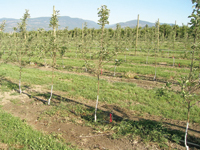 |
| An example of a replanted orchard plot in the Okanagan Valley. Photo courtesy of Bernie Solymár |
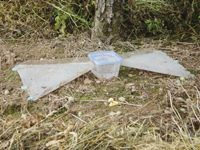 |
| Ramp traps, such as this one, are used to monitor beneficial ground beetles in the orchard. Photo courtesy of Bernie Solymár |
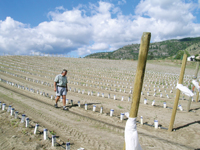 |
| Bernie Solymár walks through a newly planted apple orchard in the Okanagan Valley of B.C. The waxed milk cartons are used to protect the young bench grafts. Photo courtesy of Bernie Solymár |
Starting in 2001, the project was rolled into the National Apple Integrated Fruit Production (IFP) Program. With the new funding, the participating apple growers were able to continue their “reduced risk IPM” demonstrations, already ongoing. A renewed emphasis on eliminating all organophosphate, carbamate and pyrethroids use has been applied. The recent registrations of new reduced-risk chemistries (e.g. several mating disruption products, Intrepid, Success, several neonicotinoids and, most recently, Rimon) has allowed this new phase of the program to progress rapidly. In 2007, it’s expected that the only organophosphate use may be a couple of border sprays of Imidan. Sevin, applied at reduced rates for chemical thinning, will be the only carbamate used. All miticide and pyrethroid use will be eliminated, and the growers’ apple scab management program will consist of an integrated program using at least four chemical families.
This ground-breaking project, entering its 11th season, is the longest running commercial on-farm demonstration trial in Canada and has provided some important benefits for the Ontario apple industry. Participating growers, and the consultant, have had first-hand experience in testing new reduced risk products and innovative technologies. Neighbouring growers, as well as those from other apple growing areas in the province, have also been exposed to the results of these trials through farm tours and presentations. Many have used their new-found knowledge to upgrade their own IPM programs. The knowledge gained from the trials has provided information towards publication of a biannual IFP Spray Guidelines for Ontario Apples, which is distributed by the Ontario Apple Growers to all members in the province. Finally, the adoption of the reduced-risk IPM programs developed through this ongoing project, has helped apple growers in continuing to meet increasingly stringent market demands and opened new doors for marketing their apples domestically.
Trials in B.C.
The Okanagan Valley in British Columbia offers a unique climate: mild winters, hot and dry summers, and fertile soils – an ideal scenario for apple production. The North-Central Okanagan growing region in British Columbia is known for the production of high quality fruit, due to its location, climate and progressive growers. The Okanagan North Grower’s Co-operative (now part of the Okanagan Tree Fruit Company) receives more than 60 million pounds of apples from 165 grower members annually, covering an area of approximately 2,500 acres.
The absence of plum curculio, apple maggot, European apple sawfly or significant apple scab pressure has allowed the B.C. apple industry to advance its Integrated Pest Management (IPM) programs beyond that of Eastern Canada producers. The one major headache that Okanagan growers face is the codling moth. The Okanagan Kootenay Sterile Insect Release program (SIR), developed to address this pest, operates throughout the Okanagan. SIR staff annually conduct codling moth trap set-up and monitoring to detect wild moth captures, and provide damage assessments for the orchards, including one pre-harvest assessment of 1,000 fruit.
In 2005, the Okanagan Tree Fruit Company (OTFC) initiated trials to demonstrate the use of reduced risk pesticides and other emerging technologies as a way of improving on-farm practices, a component of the national Integrated Fruit Production (IFP) project. These ongoing trials are being conducted in five commercial apple orchards in the Okanagan Valley – two near Vernon, two in the Winfield area, and one near Oyama. The
participating orchards were chosen by OTFC field staff based on the co-operative nature of the growers and to address specific IPM issues of growers in those areas. Examples of some of these on-going trials are:
Mating disruption
A triple blend lure, consisting of codling moth, obliquebanded leafroller, and budmoth pheromones (Isomate-CM/LR/BM, provided on an experimental basis by Pacific BioControl Corporation) is being tested as an effective alternative to conventional organophosphate insecticides to complement the SIR program at one of the sites. In 2005, damage assessments conducted by SIR in August showed levels of CM damage at 0.5 per cent in the conventional and mating disruption treated blocks and in 2006 0.0 per cent damage in the conventional blocks and 0.20 per cent damage in mating disruption treated blocks.
Alternatives for codling moth and leafroller control
Intrepid, Confirm, Success 480, Assail and Virosoft are being tested as alternatives to organophosphate insecticides. Intrepid and Confirm 2F were used in a couple of the trial blocks, and were as effective as Guthion. Intrepid is 10 times more potent than Confirm, and has ovicidal properties, meaning it can be applied earlier than the normal CM/LR timing. Success 480, is registered for leafroller larvae control only. Success is the main control spray used for the leafroller complex from petal fall into the summer. Virosoft, applied every 10 to 12 days, showed promise for codling moth control at one site. The product (a granulosis virus specific to codling moth larvae) was applied on its own, in order to prevent any tank mix problems. In general, despite being used in a high-pressure orchard situation, the grower was very pleased with the results in the trial blocks, and will continue to use the product for the last year of the trial. Assail is one of the products recommended in an integrated spray program for codling moth, with the added bonus of getting leafhoppers and aphids as well. In the Okanagan there have been, however, incidences of mite flare-ups with the repeated use of this product.
Weed management
Ignite has been used in the Okanagan for only a couple of years, despite being registered years ago. As part of the national IFP trial, Ignite is being compared to Gramoxone and Roundup in regards to efficacy on orchard weeds and for rotational purposes. The two co-operators who used Ignite were happy with the results, and when compared to Gramoxone or Round Up, found it more effective on tougher weeds, like bindweed and mallow. One grower also noted that Ignite was less volatile than Gramoxone, with less exposure to fumes. It was also noted that Round Up controlled the regrowth of weeds longer than Ignite.
The use of compost and mulch in the Okanagan is not as widespread amongst conventional growers, although organic producers use them extensively. The project looked at the use of waste wood products (provided at no charge by a local landscape company) and shredded paper (from the local recycling depot) for weed suppression and moisture retention. Both products provided good weed suppression. Generally growers feel mulching is too costly and time consuming, but by making them aware that there is a local source, the trial has demonstrated with some planning and a free source of material, the technique can be cost effective. Several additional aspects to this technology will need study – investigating mulch spreaders that make the application quick and easy and the other possible benefits for paper mulch, including light reflection, increasing the size and colour of the fruit, and increasing soil microbial activity.
In general, orchards throughout the Okanagan are moving towards a more complete Integrated Fruit Production program. These trials, along with the dissemination of results during summer orchard tours and winter meeting for growers, provided by packing house field staff, is helping make the move to IFP a more informed and confident one.
Bernie Solymár owns EarthTramper Consulting Inc., based near Simcoe, Ontario. He also serves as the Canadian Horticultural Council’s National Apple IFP Project Coordinator.
Print this page